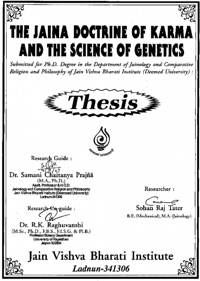Desires
The root cause of binding karma is desire. Desire is the source of human happiness as well as misery. It can be said that the bondage of karma is really the bondage of desire. The desire of possessions, acquisition and enjoyment knows no end. It can be ended only by achieving its opposition, a state of complete desirelessness in which there is no trace of attachment to anything whatsoever (vītarāga). The moment the self thinks of enjoyment, its action body (kārmaṇa śarīra) attracts minute and subtle particles according to nature of enjoyment. No outside agencies are involved in this process, the self by its own force receives and retains those karmic particles. This process results in transmigration. S.N. Das Gupta is right when he says - Karma only comes as a connecting link between desire and rebirth.[21]
The processes are prescribed in paṅcāstikāya in the following words - Penetration by matter is due to activity (yoga) and activity arises from mind, body and speech. Bondage of soul is due to thought activity and that thought is accompanied by desire, passions inflammation and infatuation (or intoxication). [22] The rise of karma, its causes and consequences are discussed in many Jaina texts. According to Tattvārtha Sūtra, the self because of its association with passions attracts karmic particles, which are fit to turn into karmas. This is bondage. [23] A commentator of Tattvārtha Sūtra has illustrated the association of the self with karmic matter in the following manner—Even as a lamp by its temperature draws up the oil with its wick and, after drawing up, converts the oil into its body (viz. glow) exactly so does a soul-lamp, with the attributes of attachment and material aggregates by the wick of its activities and, after attracting, transform them into karma. [24]
 Prof. Dr. Sohan Raj Tater
Prof. Dr. Sohan Raj Tater
 Doctoral Thesis, JVBU
Doctoral Thesis, JVBU